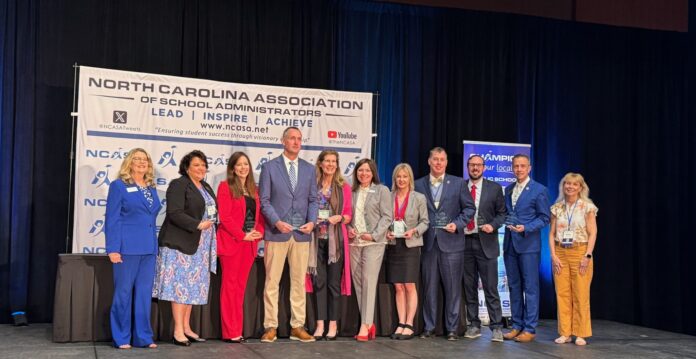The N.C. Association of School Administrators (NCASA) surprised superintendents from the 11 districts who sustained the most damage in Hurricane Helene last week with the Raymond Sarbaugh Leadership Award, named after NCASA’s first executive director.
The awards were presented on behalf of their district administrative teams for exemplary leadership in a time of crisis, said Katherine Joyce, the executive director of NCASA.
Presented annually to exceptional education administrators and/or state leaders for their contributions to support K-12 public education in North Carolina, the award was presented to:
- Superintendent Eisa Cox, Ashe County Schools
- Superintendent Maggie Fehrman, Asheville City Schools
- Interim Superintendent Terry Worrell, Avery County Schools
- Superintendent Rob Jackson, Buncombe County Schools
- Superintendent Trevor Putnam, Haywood County Schools
- Superintendent Mark Garrett, Henderson County Public Schools
- Superintendent Will Hoffman, Madison County Schools
- Superintendent Tracy Grit, McDowell County Schools
- Superintendent Chad Calhoun, Mitchell County Schools
- Superintendent Leslie Anderson, Watauga County Schools
- Superintendent Kathy Amos, Yancey County Schools
“Let me tell you about their leadership,” said Joyce during the awards ceremony:
Immediately following the impact of Hurricane Helene, these award recipients got to work ensuring not only that their staff and students were safe, but also that their entire communities had the support and resources needed to begin recovering. From transforming schools into distribution centers, organizing disaster recovery, and checking in on students and families, these superintendents and other administrators went above and beyond to restore and heal their school communities. Thanks to their efforts, their school buildings served as a place of reprieve, where community members could enjoy a hot meal and obtain needed water, food, clothes, and other supplies. Some school buildings continue to remain closed due to catastrophic damage that necessitates complete rebuilding. Meanwhile, transportation routes throughout the counties are still being reconfigured as debris is cleared and many students remain displaced from their homes. But beyond these physical challenges, ensuring the mental health and wellbeing of their students and staff has become a top priority, especially considering the district closures that lasted from one week to over a month in some cases.
“These leaders are dedicated to helping their communities recover and thrive despite ongoing obstacles,” said Joyce.
Earlier in the conference, the superintendents shared lessons learned with administrative teams from across the state.
